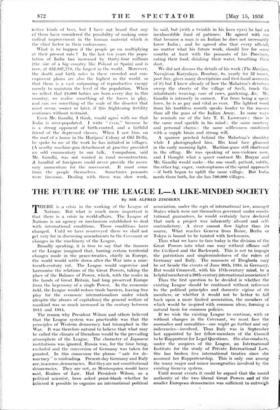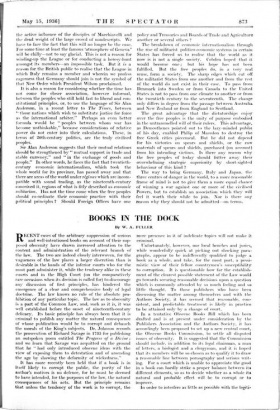THE FUTURE OF THE LEAGUE L A LIKE-MINDED SOCIETY
By SIR ALFRED ZIMMERN
THERE is a crisis in the working of the League of Nations. But what is much more important is that there is a crisis in world-affairs. The League of Nations is an agency or mechanism established to deal with international conditions. Those conditions have changed. Until we have resurveyed them we shall not get very far in discussing amendments to the Covenant or changes in the machinery of the League.
Broadly speaking, it is true to say that the framers of the League imagined that, barring certain territorial changes made in the peace-treaties, chiefly in Europe, the world would settle down after the War into a nine- teenth-century rut. The League would supervise and harmonise the relations of the Great Powers, taking the place of the Balance of Power, which, with the scales in the hands of Great Britain, had long preserved -Europe from the hegemony of a single Power. - In the economic field, the League would reduce trade barriers, leaving free play for the economic internationalism under which (despite the abuses of capitalism) the general welfare of mankind was so much increased in the century between 1815 and 1914.
The reason why President Wilson and others believed that the League system was practicable was that the principles of Western democracy had triumphed in the War. It was therefore natural to believe that what may be called the climate of liberalism would be the prevailing atmosphere of the League. The character of Japanese institutions was ignored, Russia was, for the time being, excluded and the conversion of Germany was taken for granted. In this connexion the phrase " safe for de- mocracy" is misleading. Present-day Germany and Italy are, in a sense, democracies. But they are not constitutional democracies. They are' not, as- Montesquieu would have said, • Realms of •Law. Had President- • Wilson; as a political- scientist, been asked - point-blank whether• he believed it possible to organise an international political association, under the wgis of international law, amongst States which were not themselves governed under consti- tutional guarantees, he would certainly have declared that such a project was inherently absurd and self- contradictory. A river cannot flow higher than its source. What reaches Geneva from Rome, Berlin or Tokyo is bound to be tainted with lawlessness.
Thus what we have to- face today is the division of the Great Powers into what one may without offence -call the Civilised and the Backward. This is not •to impugn the patriotism and singlemindedness of the rulers of Germany and Italy. The massacre of Drogheda may be set beside the events of June 30th, 1934, in Germany. But would Cromwell, with his 17th-century mind, be a helpful member of a 20th-century international association Thus the first question to be decided is whether the existing League should be continued without reference to the political principles and domestic 'regime of its members, or whether it would not be better to fall back upon a more limited association, the members of which would be inspired with common ideas, forming a natural basis for common policies.
If we wish the existing League to continue, with or without changes in the Covenant, we must face the anomalies and unrealities—one might go further and say indecencies—involved. Thus Italy was in September last appointed by her fellow-members of the Council to be Rapporteur for Legal Questions. She also conducts, under the auspices of the League, an International Institute for the study of Private International Law. She has broken five international treaties since she assumed her Rapporteurship. This is only one among the many major and minor incongruities involved by the existing Geneva system.
Until recent events it could be argued -that- the moral authority of-- the- two • liberal Great Powers and of the smaller European democracies was sufficient to outweigh • the active influence of the disciples of Macchiavelli and the dead weight of the large crowd of nondescripts. We have to face the fact that this will no longer be the case. For some time at least the famous 'atmosphere of Geneva' will be chilly—not to say glacial. This is not a reason for winding-up the League or for conducting a heresy-hunt amongst its members—an impossible task. But it is a reason for the British public to realise that the League in which Italy remains a member and wherein we profess eagerness that Germany should join is not the symbol of that New Order which President Wilson proclaimed.
It is also a reason for considering whether the time has not come for closer association, however informal, between the peoples who still hold fast to liberal and con- stitutional principles, or, to use the language of Sir Alan Anderson, in a recent letter to The Times, between " those nations which wish to substitute justice for force as the international arbiter." Perhaps an even better formula would be " peoples between whom war has become unthinkable," because considerations of relative power do not enter into their calculations. These, in terms of 20th-century politics, are the truly civilised peoples.
Sir Alan Anderson suggests that their mutual relations should be strengthened by " mutual support in trade and stable currency," and " in the exchange of goods and people." In other words, he faces the fact that twentieth- century economic internationalism, which took the whole- world for its province, has passed away and that there are areas of the world under regimes which are incom- patible with sound trading, as the nineteenth-century conceived it, regions of what is fitly described as economic militarism. Has not the time come when the free peoples should co-ordinate their economic practice with their political principles ? Should Foreign Offices have one policy and Treasuries and Boards of Trade and Agriculture another or several others ?
The breakdown of economic internationalism through the rise of militarist politico-economic systems in certain States has forced us to realise that the world as it now is is not a single society. Cobden hoped that it would become one ; but his hope has not been fulfilled. But the free peoples do, in a very real sense, form a society. The sharp edges which cut off the militarist States from one another and from the rest of the world do not exist in their case. To pass from Denmark into Sweden or from Canada to the United States is not to pass from one climate to another or from the twentieth century to the seventeenth. The change only differs in degree from the passage between Australia and New Zealand or from England to Scotland.
The great advantage that the dictatorships enjoy over the free peoples is the unity of purpose embodied in the untrammelled will of their rulers. This advantage, as Demosthenes pointed out to the lazy-minded public of his day, enabled Philip of Macedon to destroy the free Greek cities piecemeal. But he did not depend for his victories on spears and shields, or the raw materials of spears and shields, purchased (on account) from his intending victims. Is there any reason why the free peoples of today should fritter away their overwhelming strategic superiority by short-sighted behaviour of this kind ?
The way to bring Germany, Italy and Japan, the three centres of danger in the world, to a more reasonable frame of mind is not to give them a more equal chance of winning a war against one or more of the civilised Powers, but to establish an association which they will feel it worth their while to join. Nor is there any reason why they should not be admitted—on terms.























































 Previous page
Previous page